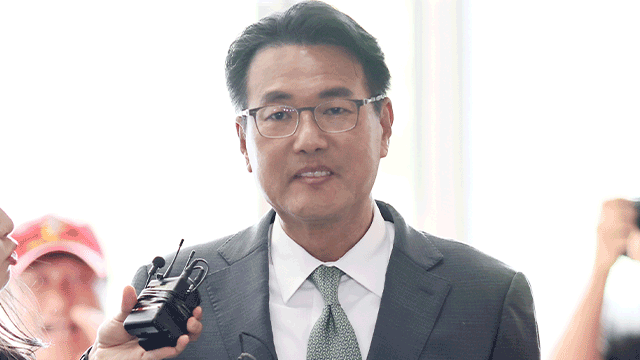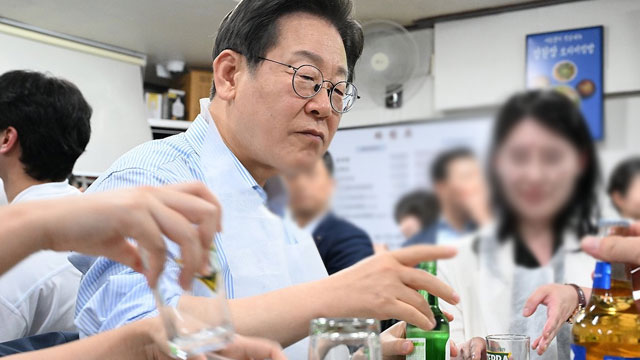Pension fund to run out in 31 years without reform
입력 2025.01.02 (00:08)
읽어주기 기능은 크롬기반의
브라우저에서만 사용하실 수 있습니다.
[Anchor]
As South Korea enters an 'ultra-aged society', KBS will examine the urgent issues that need to be addressed starting today (1.1).
The first topic is the national pension issue.
As the years go by, the number of contributors is decreasing while the number of beneficiaries is increasing, leading to predictions that the fund will run out in 31 years if this continues.
Hong Jin-ah reports.
[Report]
The national pension reform has not made any progress for 17 years.
As distrust among the younger generation grows, there are even calls to abolish the national pension altogether.
[Kwon Ye-young/University Student: "Was it really inevitable that it came to this? Did it really have to be postponed this long...?"]
[Son Young-kwang/Co-representative of Youth Pension Reform Action: "We might not receive it at all, and if this could lead to a situation where we would have to invest enormous taxes for the future, only to ruin the country, then even if we do receive it, it is a problem."]
The citizen representative group for the national pension, formed last year, chose a plan to pay more and receive more.
However, the 21st National Assembly failed to reach an agreement on what the income replacement rate, which is the ratio of pension amount to average income, should be.
Subsequently, the government proposed a reform plan to raise the contribution rate from 9% to 13% while maintaining the current income replacement rate at 42%.
The proposal also included an 'automatic adjustment mechanism' that would apply different contribution rates based on age and adjust pension amounts according to demographic structure and economic conditions.
In the 22nd National Assembly, more than six months have passed without even forming a special committee for pension reform, and discussions have completely halted due to the impeachment proceedings against the president.
If this continues, the fund will run out in 31 years.
There are also forecasts that even doubling the contribution rate will be insufficient to prevent the depletion of the fund.
[Yoon Seok-myung/Honorary Research Fellow at the Korea Institute for Health and Social Affairs: "These children, who are born at a rate of 200,000 to 250,000 a year, will have to support generations that were born at a rate of 700,000 to 1,000,000 a year. This means we have already missed the golden time for pension reform."]
The government estimates that if pension reform is delayed, the burden on the public will reach an average of 88.5 billion won per day.
This is KBS News, Hong Jin-ah.
As South Korea enters an 'ultra-aged society', KBS will examine the urgent issues that need to be addressed starting today (1.1).
The first topic is the national pension issue.
As the years go by, the number of contributors is decreasing while the number of beneficiaries is increasing, leading to predictions that the fund will run out in 31 years if this continues.
Hong Jin-ah reports.
[Report]
The national pension reform has not made any progress for 17 years.
As distrust among the younger generation grows, there are even calls to abolish the national pension altogether.
[Kwon Ye-young/University Student: "Was it really inevitable that it came to this? Did it really have to be postponed this long...?"]
[Son Young-kwang/Co-representative of Youth Pension Reform Action: "We might not receive it at all, and if this could lead to a situation where we would have to invest enormous taxes for the future, only to ruin the country, then even if we do receive it, it is a problem."]
The citizen representative group for the national pension, formed last year, chose a plan to pay more and receive more.
However, the 21st National Assembly failed to reach an agreement on what the income replacement rate, which is the ratio of pension amount to average income, should be.
Subsequently, the government proposed a reform plan to raise the contribution rate from 9% to 13% while maintaining the current income replacement rate at 42%.
The proposal also included an 'automatic adjustment mechanism' that would apply different contribution rates based on age and adjust pension amounts according to demographic structure and economic conditions.
In the 22nd National Assembly, more than six months have passed without even forming a special committee for pension reform, and discussions have completely halted due to the impeachment proceedings against the president.
If this continues, the fund will run out in 31 years.
There are also forecasts that even doubling the contribution rate will be insufficient to prevent the depletion of the fund.
[Yoon Seok-myung/Honorary Research Fellow at the Korea Institute for Health and Social Affairs: "These children, who are born at a rate of 200,000 to 250,000 a year, will have to support generations that were born at a rate of 700,000 to 1,000,000 a year. This means we have already missed the golden time for pension reform."]
The government estimates that if pension reform is delayed, the burden on the public will reach an average of 88.5 billion won per day.
This is KBS News, Hong Jin-ah.
■ 제보하기
▷ 카카오톡 : 'KBS제보' 검색, 채널 추가
▷ 전화 : 02-781-1234, 4444
▷ 이메일 : kbs1234@kbs.co.kr
▷ 유튜브, 네이버, 카카오에서도 KBS뉴스를 구독해주세요!
- Pension fund to run out in 31 years without reform
-
- 입력 2025-01-02 00:08:03

[Anchor]
As South Korea enters an 'ultra-aged society', KBS will examine the urgent issues that need to be addressed starting today (1.1).
The first topic is the national pension issue.
As the years go by, the number of contributors is decreasing while the number of beneficiaries is increasing, leading to predictions that the fund will run out in 31 years if this continues.
Hong Jin-ah reports.
[Report]
The national pension reform has not made any progress for 17 years.
As distrust among the younger generation grows, there are even calls to abolish the national pension altogether.
[Kwon Ye-young/University Student: "Was it really inevitable that it came to this? Did it really have to be postponed this long...?"]
[Son Young-kwang/Co-representative of Youth Pension Reform Action: "We might not receive it at all, and if this could lead to a situation where we would have to invest enormous taxes for the future, only to ruin the country, then even if we do receive it, it is a problem."]
The citizen representative group for the national pension, formed last year, chose a plan to pay more and receive more.
However, the 21st National Assembly failed to reach an agreement on what the income replacement rate, which is the ratio of pension amount to average income, should be.
Subsequently, the government proposed a reform plan to raise the contribution rate from 9% to 13% while maintaining the current income replacement rate at 42%.
The proposal also included an 'automatic adjustment mechanism' that would apply different contribution rates based on age and adjust pension amounts according to demographic structure and economic conditions.
In the 22nd National Assembly, more than six months have passed without even forming a special committee for pension reform, and discussions have completely halted due to the impeachment proceedings against the president.
If this continues, the fund will run out in 31 years.
There are also forecasts that even doubling the contribution rate will be insufficient to prevent the depletion of the fund.
[Yoon Seok-myung/Honorary Research Fellow at the Korea Institute for Health and Social Affairs: "These children, who are born at a rate of 200,000 to 250,000 a year, will have to support generations that were born at a rate of 700,000 to 1,000,000 a year. This means we have already missed the golden time for pension reform."]
The government estimates that if pension reform is delayed, the burden on the public will reach an average of 88.5 billion won per day.
This is KBS News, Hong Jin-ah.
As South Korea enters an 'ultra-aged society', KBS will examine the urgent issues that need to be addressed starting today (1.1).
The first topic is the national pension issue.
As the years go by, the number of contributors is decreasing while the number of beneficiaries is increasing, leading to predictions that the fund will run out in 31 years if this continues.
Hong Jin-ah reports.
[Report]
The national pension reform has not made any progress for 17 years.
As distrust among the younger generation grows, there are even calls to abolish the national pension altogether.
[Kwon Ye-young/University Student: "Was it really inevitable that it came to this? Did it really have to be postponed this long...?"]
[Son Young-kwang/Co-representative of Youth Pension Reform Action: "We might not receive it at all, and if this could lead to a situation where we would have to invest enormous taxes for the future, only to ruin the country, then even if we do receive it, it is a problem."]
The citizen representative group for the national pension, formed last year, chose a plan to pay more and receive more.
However, the 21st National Assembly failed to reach an agreement on what the income replacement rate, which is the ratio of pension amount to average income, should be.
Subsequently, the government proposed a reform plan to raise the contribution rate from 9% to 13% while maintaining the current income replacement rate at 42%.
The proposal also included an 'automatic adjustment mechanism' that would apply different contribution rates based on age and adjust pension amounts according to demographic structure and economic conditions.
In the 22nd National Assembly, more than six months have passed without even forming a special committee for pension reform, and discussions have completely halted due to the impeachment proceedings against the president.
If this continues, the fund will run out in 31 years.
There are also forecasts that even doubling the contribution rate will be insufficient to prevent the depletion of the fund.
[Yoon Seok-myung/Honorary Research Fellow at the Korea Institute for Health and Social Affairs: "These children, who are born at a rate of 200,000 to 250,000 a year, will have to support generations that were born at a rate of 700,000 to 1,000,000 a year. This means we have already missed the golden time for pension reform."]
The government estimates that if pension reform is delayed, the burden on the public will reach an average of 88.5 billion won per day.
This is KBS News, Hong Jin-ah.
-
-

홍진아 기자 gina@kbs.co.kr
홍진아 기자의 기사 모음
-
이 기사가 좋으셨다면
-
좋아요
0
-
응원해요
0
-
후속 원해요
0















이 기사에 대한 의견을 남겨주세요.